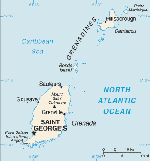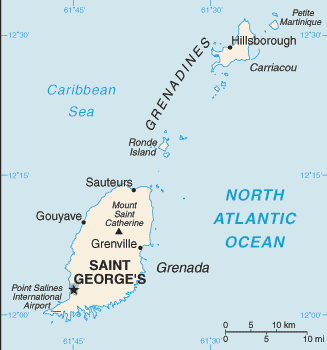 Grenada
Grenada
Country Specific Information
On this page » |
|
March 30, 2007
COUNTRY DESCRIPTION: 
 Grenada is a developing Caribbean island nation. The capital is St. George’s. Tourism facilities vary, according to price
and area. Read the Department of State Background Notes on Grenada for additional information.
Grenada is a developing Caribbean island nation. The capital is St. George’s. Tourism facilities vary, according to price
and area. Read the Department of State Background Notes on Grenada for additional information.
There is no visa requirement for stays up to three months. There is an airport departure fee of US$20 for adults and US$10 for children between the ages of five and twelve.
Read our information on dual Nationality and the prevention of international child abduction. Also, please see our Customs Information .
SAFETY AND SECURITY: For the latest security information, Americans traveling abroad should regularly monitor the Department’s Internet web site, where the current Worldwide Caution, Travel Warnings and Travel Alerts can be found. Up-to-date information on safety and security can also be obtained by calling 1-888-407-4747 toll free in the U.S. and Canada, or for callers outside the U.S. and Canada, a regular toll-line at 1-202-501-4444. These numbers are available from 8:00 a.m. to 8:00 p.m. Eastern Time, Monday through Friday (except U.S. federal holidays).The Department of State urges American citizens to take responsibility for their own personal security while traveling overseas. For general information about appropriate measures travelers can take to protect themselves in an overseas environment, see the Department of State’s pamphlet A Safe Trip Abroad.
CRIME: Street crime occurs in Grenada. Tourists have been victims of armed robbery especially in isolated areas and thieves frequently steal credit cards, jewelry, U.S. passports and money. Mugging, purse snatching and other robberies may occur in areas near hotels, beaches and restaurants, particularly after dark. Visitors should exercise appropriate caution when walking after dark or when using the local bus system or taxis hired on the road. It is advisable to hire taxis to and from restaurants. INFORMATION FOR VICTIMS OF CRIME: The loss or theft abroad of a U.S. passport should be reported immediately to the local police and the nearest U.S. Embassy or Consulate. If you are the victim of a crime while overseas, in addition to reporting to local police, please contact the nearest U.S. Embassy or Consulate for assistance. The Embassy/Consulate staff can, for example, assist you to find appropriate medical care, contact family members or friends and explain how funds could be transferred. Although the investigation and prosecution of the crime is solely the responsibility of local authorities, consular officers can help you to understand the local criminal justice process and to find an attorney if needed. See our information on Victims of Crime. MEDICAL FACILITIES AND HEALTH INFORMATION: Medical care is limited. U.S. citizens requiring medical treatment may contact the U.S Embassy in St. George’s for a list of local doctors, dentists, pharmacies and hospitals. Serious medical problems requiring hospitalization and/or medical evacuation to the U.S. can cost thousands of dollars. Doctors and hospitals often expect immediate cash payment for health services. Pharmacies are usually well stocked, and prescription medicine is available, but travelers are advised to bring with them sufficient prescription medicine for the length of their stay as occasionally there are temporary shortages of medicines; most pharmacies will check with others in the area to see if they can get what is needed. Grenada chlorinates its water, making it generally safe to drink. However, during especially heavy rains, quality control can slip, particularly in the city of St. George’s. It is recommended that visitors to Grenada request bottled water, which is widely available and relatively inexpensive.Information on vaccinations and other health precautions, such as safe food and water precautions and insect bite protection, may be obtained from the Centers for Disease Control and Prevention’s hotline for international travelers at 1-877-FYI-TRIP (1-877-394-8747) or via the CDC’s Internet site at http://www.cdc.gov/travel. For information about outbreaks of infectious diseases abroad consult the World Health Organization’s (WHO) website at http://www.who.int/en. Further health information for travelers is available at http://www.who.int/ith.
MEDICAL INSURANCE: The Department of State strongly urges Americans to consult with their medical insurance company prior to traveling abroad to confirm whether their policy applies overseas and whether it will cover emergency expenses such as a medical evacuation. Please see our information on medical insurance overseas. TRAFFIC SAFETY AND ROAD CONDITIONS: While in a foreign country, U.S. citizens may encounter road conditions that differ significantly from those in the United States. The information below concerning Grenada is provided for general reference only, and may not be totally accurate in a particular location or circumstance. Traffic moves on the left in Grenada; the majority of vehicles are right hand drive. Grenada’s roads, paved and unpaved, are mostly narrow and winding, with many blind corners and narrow or no shoulders. Road surfaces often deteriorate; especially in the rainy season (June –November) before maintenance work begins. Driving conditions in Grenada, including road conditions, increasing numbers of vehicles, and sometimes undisciplined minibus drivers all require caution and reduced speed for safety. The Government of Grenada has a seat belt law; drivers and passengers found not wearing seat belts are subject to a fine of EC$1,000 (US$400). Getting a local temporary drivers license, based on valid U.S. drivers license plus EC$30 (US$12), is highly recommended. In the event of an accident, not having a valid local driver’s license may result in a fine, regardless of who is at fault. Rental vehicle companies are widely available; most of them will assist in applying for temporary driving licenses. The adequacy of road signage varies, but is generally poor to nonexistent.For specific information concerning Grenada driver’s permits, road safety, vehicle inspection, road tax and mandatory insurance, please contact the Grenada Board of Tourism in New York at 317 Madison Avenue, Suite 1704, New York, N.Y. 10017, telephone 1-800-927-9554, (212) 599 0301; Fax: 212-573-9731; e-mail: gbt@caribsurf.com or www.grenadagrenadines.com
Please refer to our Road Safety Page for more information.
Visit the website of the country’s national tourist office at www.grenadagrenadines.com. Additional general information can be found on Grenada’s Internet website at: http://www.grenadaconsulate.org.
AVIATION SAFETY OVERSIGHT: The U.S. Federal Aviation Administration (FAA) has assessed the Government of Grenada’s Civil Aviation Authority as being in compliance with International Civil Aviation Organization (ICAO) aviation safety standards for the oversight of Grenada’s air carrier operations. For more information, travelers may visit the FAA’s internet website at http://www.faa.gov/safety/programs_initiatives/oversight/iasa. SPECIAL CIRCUMSTANCES: Recovery efforts have been made from the damage caused by Hurricane Ivan in September 2004 and Hurricane Emily in July 2005. All utilities have been restored. Cruise ships have returned and all the main shopping areas are open. While the majority of hotels are up and running, there is still one major resort (Le Source), which remain closed. The resort’s management hopes to have the hotel open by the time Cricket World Cup 2007 Super Eight games take place in Grenada (alternate days April 10-21). The February 1 merger of Liat and Caribbean Star airlines has reduced the number of daily flights between Grenada and the other Eastern Caribbean islands from six to three. Travelers coming into the region from the U.S. and elsewhere should verify in advance directly with Liat that they have a valid reservation. Some travelers making reservations from outside the region have arrived in the Eastern Caribbean and discovered that the reservation they thought they had on Liat, is not recognized by the airline, resulting in delayed travel as well as additional hotel costs.Grenada experiences tropical storms during the hurricane season, from June through November. General information about natural disaster preparedness is available via the Internet from the U.S. Federal Emergency Management Agency (FEMA) at http://www.fema.gov.
It is difficult to cash personal U.S. checks in Grenada. If accepted, they will take approximately six weeks to clear by a local bank. Major credit cards are widely accepted, and ATM facilities are available at most banks. Most hotels and restaurants take U.S. currency; however, change will be in local currency.
CRIMINAL PENALTIES: While in a foreign country, a U.S. citizen is subject to that country's laws and regulations, which sometimes differ significantly from those in the United States and may not afford the protections available to the individual under U.S. law. Penalties for breaking the law can be more severe than in the United States for similar offenses. Persons violating Grenada laws, even unknowingly, may be expelled, arrested or imprisoned. Penalties for possession, use, or trafficking in illegal drugs in Grenada are severe, and convicted offenders can expect long jail sentences and heavy fines. Engaging in sexual conduct with children or using or disseminating child pornography in a foreign country is a crime, prosecutable in the United States. For more information, please see our information on criminal penalties. CHILDREN'S ISSUES: For information on international adoption of children and international parental child abduction, see the Office of Children’s Issues website.REGISTRATION / EMBASSY LOCATIONS: Americans living or traveling in Grenada are encouraged to register with the U.S. Embassy through the State Department’s travel registration website , and to obtain updated information on travel and security within Grenada. Americans without Internet access may register directly with the U.S. Embassy. By registering, American citizens make it easier for the Embassy or Consulate to contact them in case of emergency. The U.S. Embassy is located on the main road to Lance Aux Epines after the Christian Scientist Church, and is approximately 15 minutes from the Point Salines International Airport. Telephone: 1-(473) 444-1173/4/5/6; Fax: 1-(473) 444-4820; Internet e-mail: usemb_gd@caribsurf.com. Embassy hours are 8:00 am to 12:30 pm, Monday to Friday except local and American holidays.
* * *This replaces the Country Specific Information dated October 13, 2006, to update all sections.

